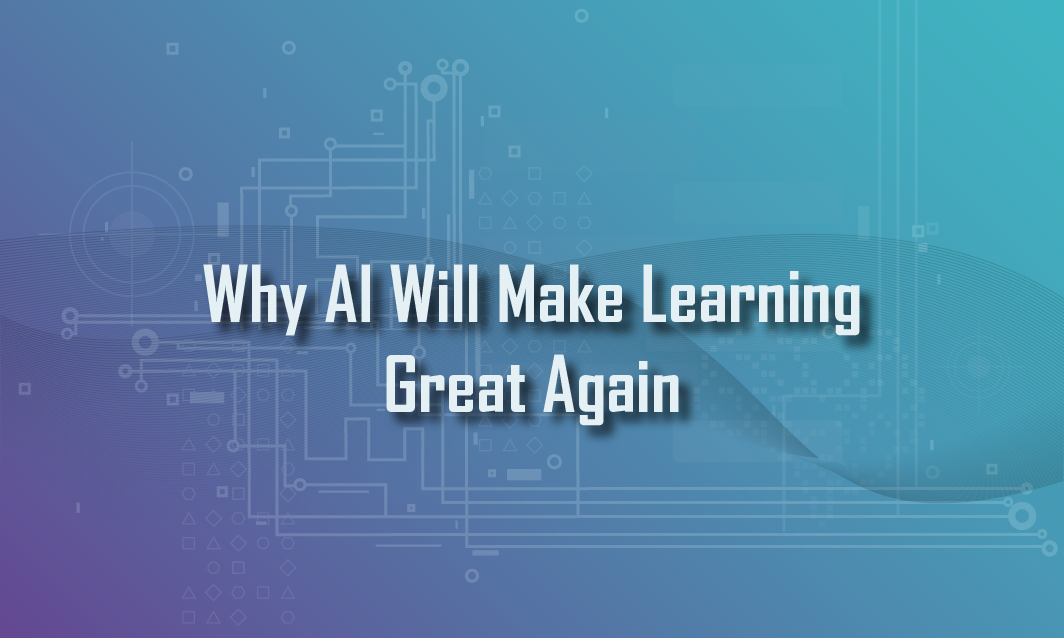AI is not something that awaits us in the future. You encounter it everyday.
Digital assistants such as Siri, Google Assistant and Cortana are classic examples of AI. The software in your car system navigating directions is AI. The Netflix recommendations you receive are made by AI.
AI is here everywhere and it will be ever more important in the years to come. In fact, it has tremendous potential to transform the way we learn and revolutionise the education industry. Here, we explore why AI will make learning great again.
Personalised Learning
Everyone is different, including the ways in which we learn. It can be challenging for an educator to figure out how to meet the needs of all learners in the classroom. Rather than forcing all learners to fit into a pre-defined curriculum (the current education model), artificial intelligence is helping educators to understand learners so that they can modify the curriculum to fit their needs. This is possible with data analytics and artificial intelligence, where we can gather information about learners’ learning curves and habits. These data allow educators to design personalised learning plans to cater to their strengths and create opportunities for practice in their weaker areas. Artificial intelligence can modify the learning path based on a learner’s progress and response, provide real-time feedback. Tests and quizzes can adapt to the learner’s input and tailor an engaging and personalised experience. Fast learners can enjoy challenging concepts while slow learners do not worry about being left behind. Learning can be more meaningful for all with artificial intelligence.
Augmented Reality/Virtual Reality
In the near future, students can go on field trips without leaving their classroom with the use of virtual reality. Imagine traveling to exotic landscapes and historic landmarks without the hassle of logistics arrangements, getting the consent of worried parents and expenditures. Similarly, in a work environment, field engineers may find themselves exploring new physical grounds (such as oil fields) without putting themselves at risk or danger through the use of virtual reality. 3D tools and visualisation techniques can enhance the learning experience for learners. In terms of augmented reality, learners can get hands-on practice or learn a new process where it is not always possible or practical. For instance, in customer-facing front line roles, employees can hone their negotiation skills or conflict resolving skills before they speak to their customers. AR can create these situations where learners interact with holographic images to practise a certain scenario. This blend of digital and real-world interactions has huge potential in learning. It helps learners prepare for managing stress in dealing with real problems and consequences of making wrong decisions.
Reinforcing Learning
As we watch children grow and learn, we are aware that we have different styles of learning. While you may prefer to curl up with a book, your colleague prefers listening to that same content over a podcast. Artificial intelligence can breathe life into traditional content and churn out a variety of content types to cater for various learners. The same piece of information could be viewed in the form of a video, an infographic, photographs and audio. Learning sticks only when the information is digestible and engaging for learners. In addition, just like how we have apps to keep track of meetings or remind us of daily tasks, artificial intelligence allows the progress of learners to be tracked and give reinforcement in learning via quizzes and assessments at various stages of the learning process. Statistics show that after one day, people forget more than 70% of what was taught in training and businesses spend more than 70 billion on training a year. With AI and intelligent systems, we can modify learning and training programmes based on success and failure points. By improving the learning experience via real-time data, companies can focus on learning that produces results.
Learning on Demand
In this digital age where most of us have mobile phones, we have constant access to information. Learning does not have to be confined to formal education, workplace seminars or flying employees to the headquarters for training. The proliferation of live mentor, coaching and management apps have made it easier for people to learn any time and any place, as long as they have Internet access. For instance, if an employee requires feedback regarding his next pitch to a business client, he could practise his speech to a chatbot via an app and have instant feedback on his tone of voice, clarity or energy and emphasis. Through multiple attempts of pitching and the help of artificial intelligence, he would gain confidence and master techniques in presentation. Our fear of embarrassment is also reduced or mitigated when we harness the use of technology, particularly AI, in our learning. Talking to chatbots is less intimidating and less painful than displaying your weakness to a colleague or boss. More importantly, AI is present 24/7, making learning accessible anytime of the day.
AI has disrupted our lives and will continue to make their way into our lives, influencing the way we do work and learn. As Bill Gates “we always overestimate the change that will occur in the next 2 years and underestimate the change that will occur in the next 10. Don’t let yourself be lulled into inaction.” By embracing the possibilities of AI in the learning space, AI can bring learning to greater heights and make learning great again for all.
If you are interested in using AI chatbots for your organisation, chat with us today!
We hope that this article is helpful. Do you have any tips you would like to add? Let us know in the comments and please share this post with a friend/colleague if you enjoyed it!
